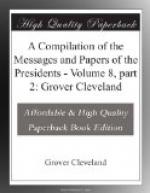The President of the United States has seen with dissatisfaction officers of the General Government taking on various occasions active parts in elections of the public functionaries, whether of the General or of the State Governments. Freedom of elections being essential to the mutual independence of governments and of the different branches of the same government, so vitally cherished by most of our constitutions, it is deemed improper for officers depending on the Executive of the Union to attempt to control or influence the free exercise of the elective right. This I am instructed, therefore, to notify to all officers within my Department holding their appointments under the authority of the President directly, and to desire them to notify to all subordinate to them. The right of any officer to give his vote at elections as a qualified citizen is not meant to be restrained, nor, however given, shall it have any effect to his prejudice; but it is expected that he will not attempt to influence the votes of others nor take any part in the business of electioneering, that being deemed inconsistent with the spirit of the Constitution and his duties to it.
[From the Writings of Thomas Jefferson, Paul Leicester Ford, Vol. VIII, pp. 99-101.]
CIRCULAR TO THE HEADS OF THE DEPARTMENTS.
WASHINGTON, November 6, 1801.
DEAR SIR: Coming all of us into executive office new and unfamiliar with the course of business previously practiced, it was not to be expected we should in the first outset adopt in every part a line of proceeding so perfect as to admit no amendment. The mode and degrees of communication, particularly between the Presidents and heads of Departments, have not been practiced exactly on the same scale in all of them. Yet it would certainly be more safe and satisfactory for ourselves as well as the public that not only the best but also an uniform course of proceeding as to manner and degree should be observed. Having been a member of the first Administration under General Washington, I can state with exactness what our course then was. Letters of business came addressed sometimes to the President, but most frequently to the heads of Departments. If addressed to himself, he referred them to the proper Department to be acted on. If to one of the Secretaries, the letter, if it required no answer, was communicated to the President simply for his information. If an answer was requisite, the Secretary of the Department communicated the letter and his proposed answer to the President. Generally they were simply sent back after perusal, which signified his approbation. Sometimes he returned them with an informal note, suggesting an alteration or a query. If a doubt of any importance arose, he reserved it for conference. By this means he was always in accurate possession of all facts and proceedings in every part of the Union, and to whatsoever Department they related; he formed a




